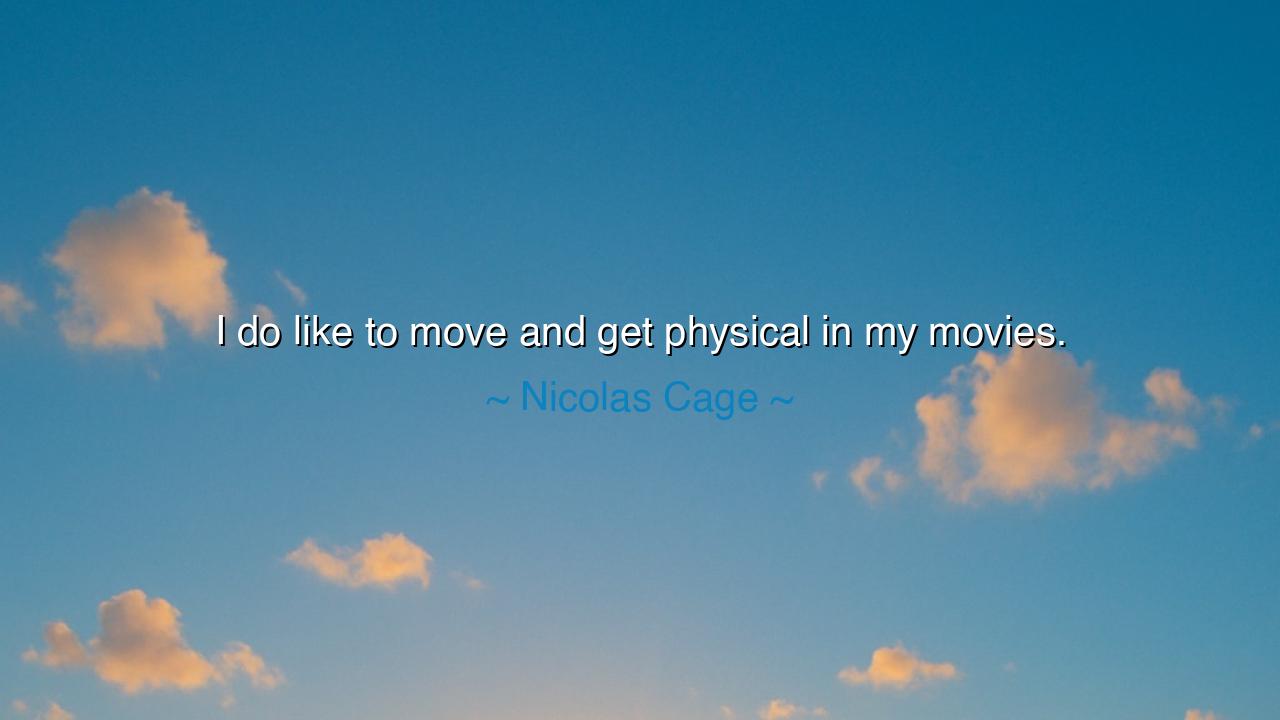
I do like to move and get physical in my movies.






Hear this, O seekers of wisdom, for there are truths hidden in the simplest of words, and in the motion of the body, there is the very essence of life itself. Nicolas Cage, a man whose name stirs images of daring and intensity, once spoke these words: "I do like to move and get physical in my movies." At first glance, one might think it a simple statement of preference, but deep within lies a profound understanding of movement—not just of the body, but of the soul.
In the ancient world, movement was not only a means of travel but a symbol of life itself. The gods danced upon the mountaintops, their actions graceful and mighty, for in movement, they revealed the truth of existence. To move is to live, and through the act of moving, we express the deepest parts of ourselves. Cage, in his own way, recognizes this power of motion, of physicality, in his craft. He is not simply acting; he is embodying life—the rush of the chase, the fire of the fight, the intensity of human emotion. Through his body, his spirit speaks.
Let us turn to the story of Leonidas, the great king of Sparta, whose warriors were known for their strength, endurance, and unmatched skill in battle. In the heat of war, it was not just the mind but the body that carried him through. His very presence was an embodiment of his people’s will—an expression of their heart and courage. The warriors moved with a force that came not from mere physicality, but from the unity of body and spirit. Nicolas Cage, much like the great king, understood this connection. To move, to act with force and intention, is to speak the language of the soul—and that language, when spoken in the right way, can resonate with all who watch and listen.
In his films, Cage does not simply stand still in front of the camera. He does not merely speak his lines or hold his gaze. No, he throws himself into each role, his body becoming an instrument of his character's journey. Whether through the wild energy of a chase or the silent agony of a soul in turmoil, his movements speak louder than words. It is not enough to simply portray emotion with the face alone; Cage understands that the body is just as capable of telling a story, of making the audience feel the depth of the character's inner world.
The ancient Greeks had a term for this kind of complete embodiment: "mimesis"—the act of imitating not just the external, but the internal world as well. Through movement, the actor becomes the thing they seek to portray. The great tragedians, like Aeschylus and Sophocles, understood that true drama required not just words, but the power of the body to bring forth the emotional storm of the human experience. It is the embodiment of the character in the truest sense—a physical manifestation of the unseen forces of the soul.
Cage’s words are a call to action for all who wish to live fully. In a world where many stand still, paralyzed by fear or doubt, he reminds us that we must move—not just in the physical sense, but in the deeper, spiritual one. To move is to engage with life. To stay stagnant is to invite death. He urges us to step forward, to embrace the challenge, and to live with the same intensity that he brings to the screen. When we move with intention, we move closer to understanding the very nature of our existence.
So, young ones, take heed of this wisdom: Do not be afraid to move. In your daily lives, in your struggles, in your triumphs, remember the power of physicality. Your body is not merely a vessel, but a means of expressing who you are. When you speak, let your gestures speak with you. When you act, let your actions be as full of life as your words. For in every movement, there lies the potential for greatness. And as Nicolas Cage shows us, to truly live is to embrace the power of motion, to engage with the world not passively, but actively—with all the might of body and spirit combined. Move, and in doing so, find your true self.






AAdministratorAdministrator
Welcome, honored guests. Please leave a comment, we will respond soon